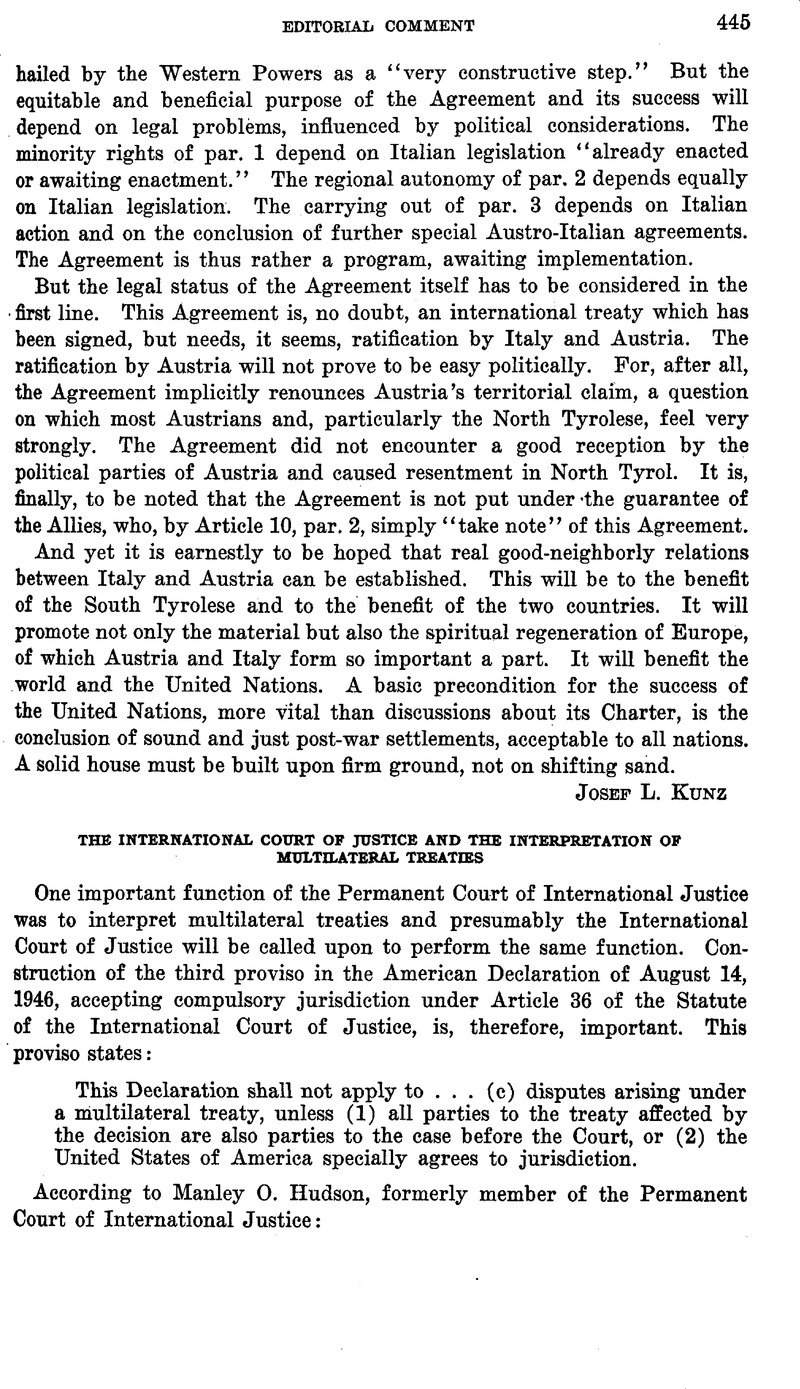Article contents
The International Court of Justice and the Interpretation of Multilateral Treaties
Published online by Cambridge University Press: 20 April 2017
Abstract

- Type
- Editorial Comment
- Information
- Copyright
- Copyright © American Society of International Law 1947
References
1 American Bar Association Journal, Vol. 32, No. 12 (December, 1946), p. 832.
2 This Journal, Vol. 40 (1946), p. 715.
3 “Toward Rule of Law,” in Free World, October, 1946, p. 50.
4 “The method of interpretation consists in finding out the connection made by the parties to an agreement, between the terms of their contract and the object to which it is to be applied.” Hyde, C. C., International Law, 1945 (2nd ed.), p. 1468 Google Scholar. Hyde, following Anzilloti, insists that evidence of intent should control the meaning even when the instrument appears to be clear. Courts have frequently held that evidence of intent, external to the text itself, can be used only to discover the meaning or sense of the words or phrases used, that is, the fixed association between the symbol and some external object, not to discover directly the will or intention of the parties. With this limitation, courts have tended continually to allow a wider latitude in the use of extrinsic evidence. Wigmore, The Law of Evidence, Vol. 4, sees. 2458 and ff.; Hudson, The Permanent Court of International Justice, 1920-1942, p. 643 ff. (commenting on the frequent absence of intention in the formulas of international instruments) ; and Wright, “The Interpretation of Multilateral Treaties,” in this Journal, Vol. 23 (1929), p. 97.
5 Compulsory Jurisdiction, International Court of Justice, Hearings before a Subcommittee of the Committee on Foreign Relations, U. S. Senate, 79th Cong., 2nd Sess., July 11, 12, and 15, 1946, p. 44.
6 Hudson, p. 420.
7 Several treaties recognizing this right are noted in Hudson, p. 420, note 81.
8 Above, note 2.
9 The almost identical text of Article 62 of the Statute of the Permanent Court of International Justice was designed to exclude “political intervention” but it has been suggested that intervention might be denied even if a legal interest is shown. Hudson, pp. 209, 420. With reference to Article 63, identical in the Statutes of the two courts, Hudson writes (p. 422) : “The action by the Registrar (in notifying states under this article) does not necessarily commit the Court, either to allowing or to excluding the intervention.” In practice there has been some flexibility in permitting intervention under this article.
10 A study of the drafting of this text in the Statute of the Permanent Court of International Justice does not clarify the intention in this regard, but Hudson writes (pp. 209, 421): “If the request is granted, the intervenor (under Article 62) becomes a party to the pending case on a footing with the other parties.”
11 An intervenor under Article 63 “becomes a party ... in so far as the proceeding relates to the construction of the convention, and the construction given by the judgment will be binding upon it; but apparently it does not become a party generally for all purposes.” Hudson, p. 422.
12 While the proper evidence for the interpretation of general treaties, like statutes, may be general or legal usage, and the proper evidence for the interpretation of bilateral treaties, like ordinary contracts, may be mutual usage understood at the time by the parties, any evidence of individual intention may be useful for the interpretation of unilateral instruments like declarations or wills. Wigmore, Sec. 2458; Francis Wharton, Commetaries on Law, 1884, Sec. 612; Wright, this Journal, Vol. 23 (1929), pp. 96-97; Harvard Research in International Law, Treaties, in this Journal, Vol. 29 (1935), Supplement, p. 957; Hudson, pp. 643 and ff.
13 This Journal, Vol. 40 (1946), p. 715.
14 Hudson writes (p. 420) that the “interest of a legal nature” referred to in Article 62 “would seem to require a special interest, in addition to a State’s general interest in the development of international law” but suggests (p. 422) that “Perhaps Article 63 may be considered as a special application of the general principle laid down in Article 62, and the fact that a State is a party to a convention to be construed may be regarded as establishing that State’s legal interest so that a judgment by the Court will not ordinarily be required.” See also note 1, above. There was a tendency to recognize that a state had a legal interest in the observance of Mandates because of its membership in the League of Nations even if no special interest of its own or of one of its nationals was involved in a particular instance but this may have arisen because of the assumption that all Members of the League had an interest in the protection of the inhabitants of these territories. Parties to the Treaty of Versailles not Members of the League had no such interest. Q. Wright, Mandates under the League of Nations, pp. 158, 473-6, 493-5.
15 Do neutral states if parties to the Hague Convention regulating the conduct of war necessarily have a legal interest in any dispute concerning those conventions between belligerents who are parties? Before becoming a member of the League, did Germany, a party to the Treaty of Versailles which included the League of Nations Covenant, have a legal interest in every dispute between two members of the League concerning the interpretation of the Covenant? Practice suggests a negative answer to these questions. On types of multipartite treaties see Hudson, International Legislation, 1931, Vol. 1, p. xvi, and Wright, Legal Problems in the Far Eastern Conflict, 1941, pp. 85 and ff.
16 Moore, Digest of International Law, Vol. 7, pp. 59 and ff. ; Haekworth, Digest of International Law, Vol. 6, pp. 125 and ff. But see Articles 60 and 61 of the Statute.
- 1
- Cited by


